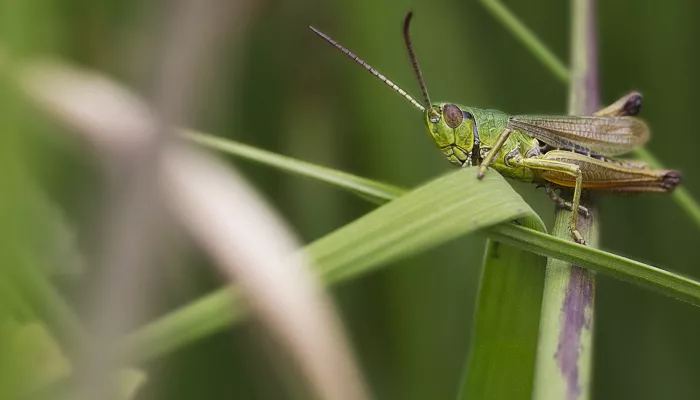Common field grasshopper
The Common field grasshopper can be found in sunny, grassy areas, particularly gardens, throughout summer. Males can be seen rubbing their legs against their wings to create a 'song' for the females.

Discover a variety of grasshopper and cricket species that live in our county! Hard to see but if you do, our species guides will help you identify them!
The Common field grasshopper can be found in sunny, grassy areas, particularly gardens, throughout summer. Males can be seen rubbing their legs against their wings to create a 'song' for the females.
The meadow grasshopper can be found in damp, unimproved pastures and meadows throughout summer. Males can be seen rubbing their legs against their wings to create a 'song' for the females.
The Common green grasshopper can be found in damp meadows and woodland rides throughout summer. Males can be seen rubbing their legs against their wings to create a 'song' for the females.
The Mottled grasshopper can be found in dry grasslands, such as railway cuttings, and heathlands throughout summer. Males can be seen rubbing their legs against their wings to create a 'song' for the females.
The Speckled bush-cricket, as its name suggests, is covered in tiny, black speckles. It can be found in scrub, hedgerows and gardens throughout summer. Males rub their wings together to create a 'song' for the females.
The Oak bush-cricket is arboreal and can be found in mature trees in woods, hedges, parks and gardens in summer. Males don't have a 'song' as such, but drum on leaves with their hind legs to attract females.
The long-winged conehead is so-named for the angled shape of its head. It can be found in grasslands, heaths and woodland rides throughout summer.
At nearly 7 cm long (including the female's long ovipositor), the Great green bush-cricket certainly lives up to its name! It can be found in grassland, scrub and woodland rides in Southern England and Wales.
The Dark bush-cricket, as its name suggests, is dark brown or reddish. It can be found in woodlands, hedgerows and gardens throughout summer. Its irregular chirpings are a familiar sound of summer.
The song of the Roesel's bush-cricket is very characteristic: long, monotonous and mechanical. It can be heard in rough grassland, scrub and damp meadows in the south of the UK, but it is spreading north.